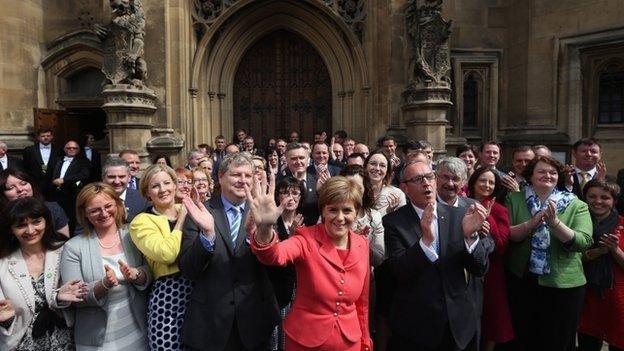The SNP's gradual approach begins
- Published
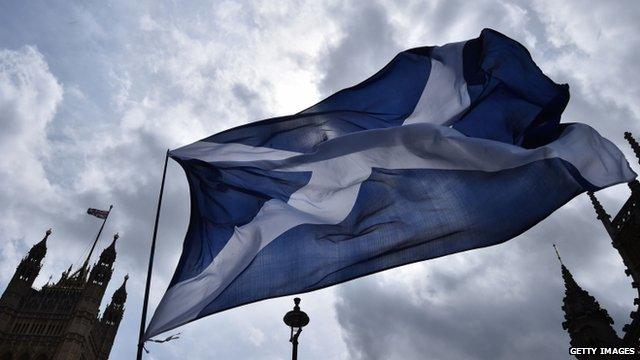
The Saltire was flying in Westminster as new MPs gathered to begin work
So where now? Politics never stands still and so progress, momentum and altered perspective there must be.
The election result in Scotland was apocalyptic, revolutionary even. A popular insurrection, throwing off the previously established pattern of Scotland's contribution to UK politics.
While Scotland voted near universally Nationalist, England voted pretty solidly Tory - enough to engender an overall majority.
As I noted on Friday, the election left Scotland and England as two nations divided by a common parliament.
In Scotland, the final outcome was like a scene from one of Shakespeare's more murderous plays - Titus Andronicus perhaps. The stage littered with political corpses.
And yet the Scottish victors resolutely decline to gloat. More particularly, they decline to demand an immediate, gargantuan response to their triumph. They decline, thus far, to humiliate the vanquished.

Who are the 56 SNP MPs?
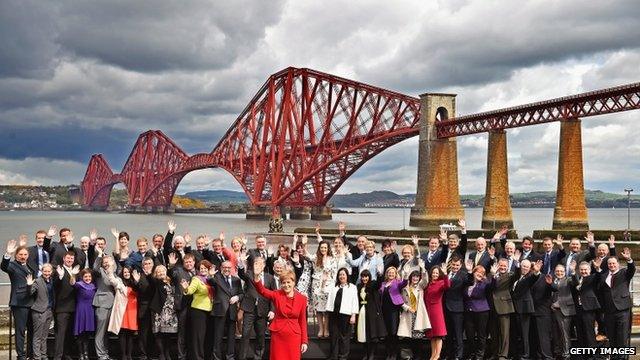
The SNP won 56 of the 59 Scottish seats at last Thursday's general election. But who are the men and women representing Scotland?

In that sense, the aftermath is more like a scene from one of the more puzzling plays of Pinter. Or Becket, even Gogol. A pause for thought. Then another. Contemplation, consideration. Resolution, yes, but modified, qualified.
Today, 56 SNP MPs are descending upon Westminster, prior to taking up their seats. I have covered Scottish politics for a wee while now. Such an event, in the earlier days of my sojourn, would have been regarded by the party as a mandate for independence.
The SNP now has an overwhelming majority of the Scottish representation in the Commons. Such was, previously, seen by the Nationalists as the trigger for opening negotiations to end the Union.
Over the weekend, I recalled this point in one of several conversations with SNP folk. My query was delivered roguishly - in that I knew the answer. With comparable drollery, I was informed, gently, that the SNP would not be asserting UDI today.
Is there an SNP list of demands?
Why not? For one thing, Nicola Sturgeon made amply and repeatedly clear during the election campaign that a vote for her party in this UK election would not mandate a further referendum, let alone independence. The question was Scotland's voice at Westminster, not Scotland's departure.
This was not, therefore, a rerun of the September plebiscite. Voters were not saying Yes to independence. However, given that the SNP's constitutional stance is scarcely a secret, those same voters were apparently inclined to go along with a party whose ultimate aim is independence, even if explicitly excluded from this contest.
The voters were not, apparently, scared off or deterred from backing the SNP, despite the arguments offered by rival parties.
Why then do the 56 MPs not arrive in Westminster with a maximalist shopping list of demands, beginning with full fiscal autonomy (FFA) - whereby Scotland would control all her own tax and spending, paying a contribution to Westminster for defence and diplomacy?
Cynics will say the reason is they have read - and grasped - the report by the Institute for Fiscal Studies, external which said that, in the current year, fiscal autonomy would land Scotland with an extra burden of £7.6bn in deficit.

2015 election results map
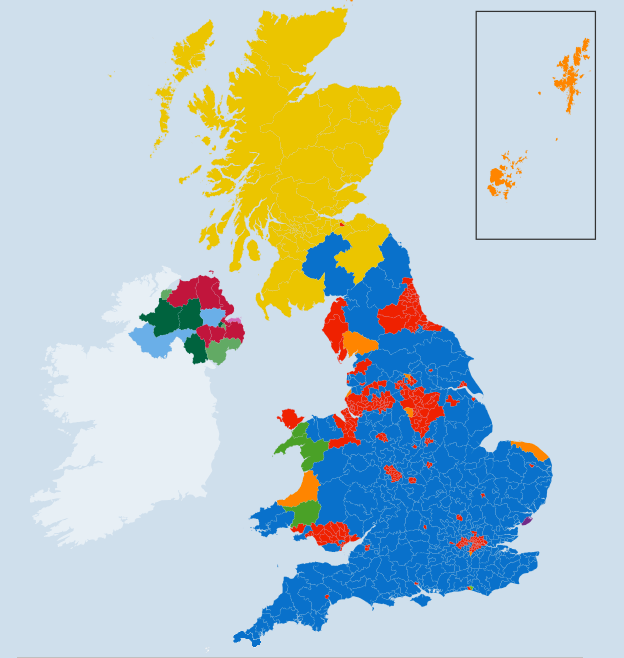
Conservatives won 331 seats and Labour 232 - followed by the SNP with 56 seats out of 59 in Scotland

Nationalists insist that - over a longer period - Scotland's fiscal picture is much rosier by comparison with the UK as a whole. Plus, they say that autonomy would allow Scotland to alter the shape of the economy in advantageous ways, bringing ultimate benefits.
So why not push for that instantly? Why does Nicola Sturgeon continue to note that FFA would take years to implement, with prolonged negotiations over, for example, the division of historic debt as between Scotland and England?
For one thing, there is an intrinsic caution in contemporary SNP strategy, even at the moment of their greatest triumph. There used to be a political battle within the SNP between the gradualists, who advocated steady progress towards the party's goal, and the fundamentalists, who argued that any offer short of independence was a cul de sac or a Unionist con trick. The gradualists won.
Indeed, gradualism is now ingrained in SNP thinking. Their approach in devolved government at Holyrood has been to work consensually and in keeping with Scottish thinking.
What will be the SNP approach?
It has not been to provoke conflict with the UK or the UK government. At this point, I think I hear some collective scoffing in the distance. You doubt me? What, truly, did the SNP in office do that was deliberately inflammatory?
Did they annexe Berwick? Ok, seriously, did they refuse to work with Whitehall? Did they refuse to set a budget? Did their MPs pursue Parnellite tactics in the Commons? Was the entire SNP endeavour transformed into a sustained protest campaign? No, no, and no again.
I think there will be a similar approach in the Commons - even with the SNP occupying the vast bulk of Scottish seats, buoyed by a majority in the popular vote.
For one thing, they know that the good and sensible people of Scotland have charged them with speaking up vigorously for Scottish interests. Seriously, sensibly and with diligence. They do not want or expect futile, gesture politics.
Secondly, there is a small matter to be borne in mind. The SNP have swept the board in Scotland. The Conservatives have a majority at Westminster - a clear, overall majority.
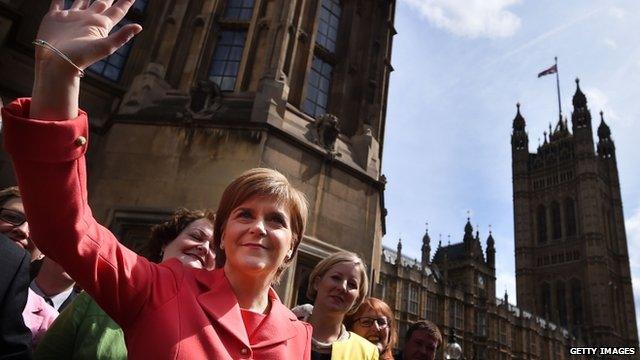
Nicola Sturgeon was in London with the 56 new SNP MPs
Say Nicola Sturgeon issues a strident demand for full-scale powers to be devolved to Scotland. David Cameron will simply say No. What then? State the SNP position more vigorously, more loudly? With what outcome? A further refusal.
In the long term, such a scenario might place further pressure upon the Union, particularly if the PM can be depicted as stubborn and obdurate in the face of legitimate Scottish demands. The SNP would regard such pressure as a plus.
But, equally, there is a danger for the SNP that such a scenario might tend rather to expose the fact that the SNP are, arithmetically, unable to deliver upon their demands at Westminster without co-operation from David Cameron.
Remember that the SNP strategy was to offer an enhanced voice for Scotland - but, most commonly, predicated upon a hung Parliament where, with the balance of power, the Nationalists could work with Labour.
What of new powers?
It was not anticipated, within that planning, that there would be a majority Conservative administration. Now that there is, the SNP leadership has to adapt tactics and strategy.
There would be little point, within a gradualist approach, in precipitating a conflict too early in the new parliament, so soon after remarkable electoral success. Little point in saying: we are the SNP and we say Yes to change - if the immediate and blunt response is: we are the majority UK government and we say No.
Not because the SNP are in any way scared of taking on the Tories - but because it is difficult to see what the immediate exit strategy from such a stand-off would be for the Nationalists. Difficult, that is, within the ambit of sustaining a serious presence at Westminster and representing the people of Scotland, as promised at the election. To stress, longer term thinking might be different.
So gradualism persists. Keep it moderate, keep it reasonable - bearing in mind that the present verdict of the Scottish people cannot be authentically construed as a mandate for independence or, indeed, for full fiscal autonomy.
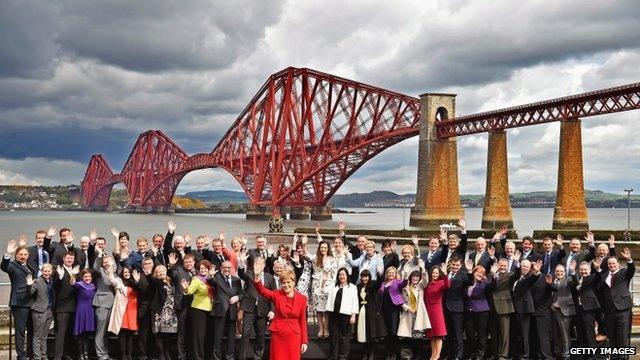
Scotland's new SNP MPs gathered at the weekend ahead of travelling to London
Bear in mind the current divisions of responsibility between Westminster and Holyrood. The UK parliament covers reserved matters, for Scotland, such as defence, foreign affairs, social security and the broad economy. Holyrood, by definition, covers the rest - including health and education.
Already in the pipeline are plans to devolve a greater share of personal income tax control to Holyrood. The commission chaired by Lord Smith, external proposed devolving full control of income tax rates and bands plus a share of welfare.
To be clear, the SNP remains in favour of independence. They yearn for it. They long for it. Every party strategy, every election, is geared towards that ultimate objective.
For now, though, for the gradualist reasons outlined above, they will primarily pursue interim objectives, building upon Smith. They will insist, firstly, that the Bill to implement change must fully enact Smith, not falling short as the SNP believe the draft proposals do.
Expect them further to press for Holyrood to gain control of employment policy, including the minimum wage; business taxation, including;
corporation tax
National Insurance
welfare, including the sanctions regime
and equality policy.
Their argument is that the transfer of these powers - while falling far short of independence - would enable the Scottish Parliament to effect substantial change in Scotland's economic fortunes. Social justice, they also argue, would potentially be improved.
So how do the Tories respond? Inevitably, there will be a temptation among some to say: give Scotland full fiscal autonomy and be done with it. See how they get on.
I do not believe that is a temptation which will extend to David Cameron. Indeed, I dangled that prospect before the PM during the election, saying: "Go on, you know you want to!" He demurred forcibly.
Further, I do not believe that the Tories will instantly seek to "punish" Scotland - perhaps by stripping down the Scottish budget - for having the temerity to vote SNP in such large numbers.
What will PM David Cameron do?
Such an approach would be counter-productive for the Conservative and - as they constantly remind us - Unionist Party.
The PM faces a conundrum. He can say no to SNP demands. He has the votes in the Commons and would undoubtedly have enthusiastic backing from Tory back-benchers.
But simple parliamentary arithmetic is not enough. Things have palpably changed -and changed utterly, to borrow from Yeats. Scotland has spoken, volubly.
It will not be sufficient for David Cameron to say: we won, business as usual, deal with it. From his perspective, it would not be sensible. It would risk infuriating the Scots, giving added succour to the SNP's campaign for ultimate independence.
And yet. In endorsing the Smith proposals, the PM went beyond the natural Unionist instincts of his party, in England and perhaps in Scotland. Can he go further without exasperating his own team?
Just as the SNP will tread relatively carefully with their demands, so the PM will respond carefully. I believe we have already seen signs of that in his renewed pronouncements upon English Votes for English Laws.
Yes, he is intent on proceeding. He describes it as essential fairness. But the tone is notably different, less strident, less aggressive.
Confronted with EVEL, the SNP tend to accept the point that there is some elemental justice here - while questioning the scope of the project. How, they say, can a Bill be said to be "England only" if it has spending consequences which, by definition, fall upon all UK taxpayers to meet?
In many ways, the election result has clarified and simplified the debate on such matters. Scotland voted Nationalist. England voted Unionist. The talks can proceed without, to be blunt, paying too much attention to either Labour or the Liberal Democrats.
But talks there will be: not, in the first instance, a shouting match. Even in implementing Smith, there will have to be fiscal adjustments to mark the new tax powers, settling a revised budget for Scotland. Such talks will be tricky - and, indeed, preparatory civil service work is already under way.
There will be alarums and excursions in the new politics. But there will be moderation and compromise too.
- Published11 May 2015
